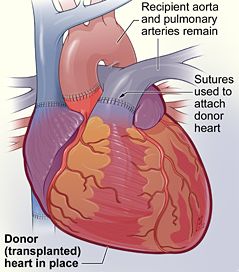Patients suffering from life threatening heart disease or end stage heart failure may be advised to get a Heart transplant done. Careful screening is done to assess the suitability of the patient for the procedure. The donor heart comes from a brain dead person whose family consents to donate the organs.
PROCEDURE
Once a donor heart becomes available, it is shifted to the centre where transplant is to take place. Under general anaesthesia, with patient/recipient on heart-lung machine, the diseased heart is removed. The donor heart is attached to the patient's blood vessels, including the atriums, pulmonary artery, and aorta. The new heart is then perfused with the patient's blood and begins beating. Defibrillation may have to be applied to gain a productive rhythm. The patient is taken off the heart-lung machine. Medications and/or a pacemaker may be needed initially for few days, until the new heart functions normally on its own.

DURATION
The procedure can take 4-12 hours. Hospital stay is of 2-3 weeks.
RECOVERY
Depends on factors like age, general health, and response to the transplant; complete recovery may take about 6 months. Immunosuppressive drugs are given to prevent the body from rejecting the new heart.
RISKS
- Organ rejection
- Infection
- Heart attack
- Stroke
- Heart rhythm problems
- Deep vein thrombosis